
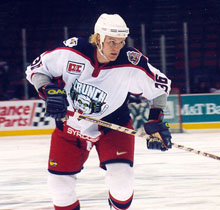
Trevor Ettinger (1980-2003)
Our Thoughts and Prayers go out to Trevor's
Family and friends. Click
HERE to post your thoughts or memories on Trevor.
A webiste Dedicated to Trevor
http://www.trevorettinger.tz4.com/ .
Pictures of Trevor
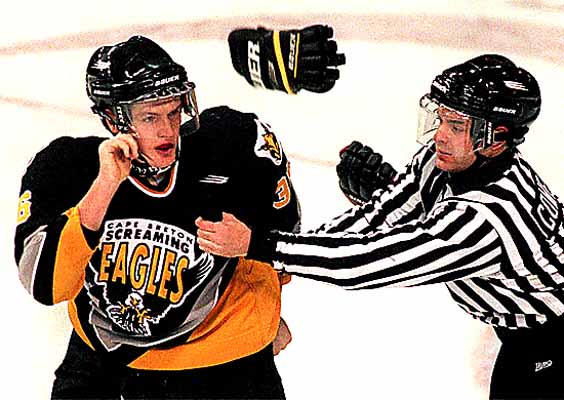
| |
|
|
Smile forever! |
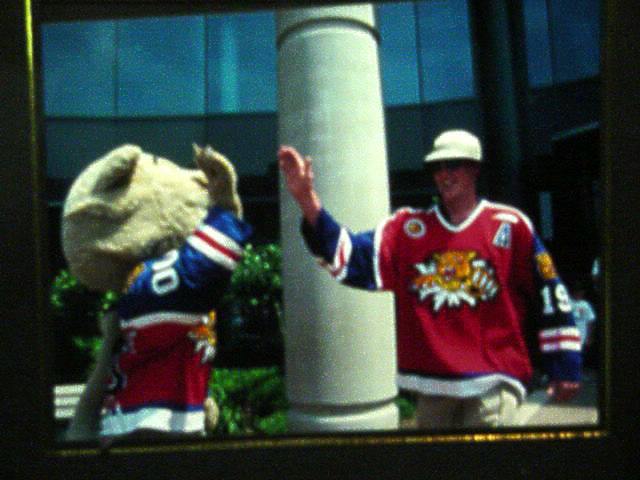
Trevor giving the Moncton
Wildcat mascot a high five.
Trevor died on July 26th 2003 at
the age of 23. Soar high
Eagle,you will be missed. |
|
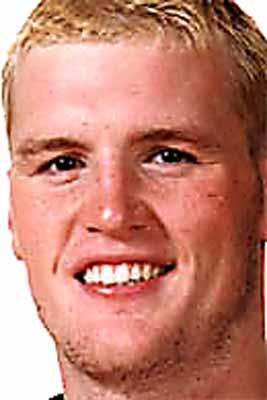
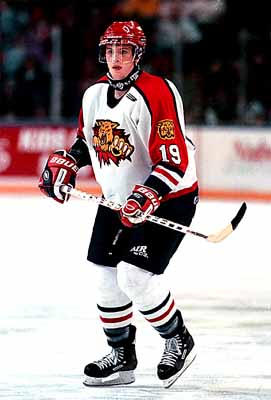
|
|
STORIES |
|
|
|
Trevor Ettinger passes
away at age 23
|
By Crunch Staff
|
www.syracusecrunch.com
July 28 2003
Trevor Ettinger,
23, who spent
the past two
seasons with the
American Hockey
League’s
Syracuse Crunch
and East Coast
Hockey League’s
Dayton Bombers,
passed away on
Saturday in
Upper Kennetcook,
Nova Scotia.
Columbus Blue
Jackets
Executive
Vice-President
and Assistant
General Manager
Jim Clark, who
oversees the
hockey
operations for
the Crunch,
Columbus’ AHL
affiliate,
issued the
following
statement: “The
Columbus Blue
Jackets,
Syracuse Crunch
and Dayton
Bombers
organizations
are shocked and
deeply saddened
by the sudden
passing of
Trevor Ettinger.
Trevor was a
tremendous young
man who was very
well liked and
respected by
those around
him. Our
thoughts and
prayers go out
to his family,
friends and
teammates during
this most
difficult time.”
Syracuse Crunch
President and
Chief Executive
Officer, Howard
Dolgon added the
following: “The
passing of
Trevor Ettinger
has touched the
Syracuse Crunch
organization
very deeply. He
was a pleasant
guy who always
had a smile on
his face and
he’ll be missed
on the ice, in
the dressing
room and in the
community. Our
sincerest
condolences go
out to his
family and
friends.”
A memorial
service will be
held on
Wednesday at 2
p.m. (Atlantic)
at the Ettinger
Funeral Home
(2812 Main St.,
Shubenacadie,
Nova Scotia B0N
2H0). The family
has requested
donations be
made to the East
Hants Minor
Hockey
Association (c/o
Hockey Nova
Scotia, Suite
910, 6080 Young
St., Halifax,
Nova Scotia B3K
2A2) or to an
animal shelter
or charity of
choice.
|
|
|
|
|
Former
Cats Captain Dies
|
By Crunch Staff
|
www.syracusecrunch.com
July 28 2003
UPPER KENNETCOOK,
N.S.
Former Moncton
Wildcats
defenceman
Trevor Ettinger
died suddenly
and unexpectedly
on Saturday
afternoon at his
mother’s house
in Upper
Kennetcook, N.S.
He was 23 years
old.
"I spoke with
his mother
(yesterday
morning)," said
Bruce Morrison,
who became a
close friend of
Ettinger when he
played for
Moncton in the
Quebec Major
Junior Hockey
League.
"She wanted me
to pass along
word to the
Wildcats fans
and close
friends that he
made while he
was here. She
came home from
work on Saturday
and found Trevor
deceased in the
house. She was
in a state you
would expect to
find a grieving
mother. She was
in a state of
shock."
RCMP in Upper
Kennetcook
didn’t return
phone calls
yesterday to
discuss details
of Ettinger’s
death. Funeral
arrangements
haven’t yet been
finalized for
the former
Wildcats
captain.
Morrison was a
billet for
former Wildcats
players Mirko
Murovic and
Bobby Reed.
"Trevor was at
my house a lot
hanging out with
those guys,"
said Morrison.
"I have pictures
of them all
together. I
became good
friends with
Trevor. I was
with him in May
at his house in
Kennetcook and
we had a good
conversation.
"He just signed
a new contract
and his career
was on track. He
was in good
spirits. We had
made
arrangements to
go on a
motorcycle ride
together. He was
invited to my
son’s wedding,
but then I
didn’t hear from
him for awhile.
"My wife hasn’t
stopped crying
all day since
hearing the
news. We’re both
very devastated.
You get to know
the players and
they become
family. We
considered
Trevor one of
the family and
we’ve always
stayed in touch
with him after
he left Moncton."
Ettinger split
his four QMJHL
seasons between
Moncton, the
Cape Breton
Screaming Eagles
and Shawinigan
Cataractes. He
had 33 points
and 1,366
penalty minutes
in 251 career
games.
The enforcer
defenceman
6-foot-5 and 230
pounds - spent
the second half
of 1999-2000 and
the first half
of the following
season with the
Wildcats. He was
the league’s top
fighter and his
combination of
physical play
and outstanding
personality made
him one of the
club’s all-time
fan favourites.
"He was a
tremendous part
of our
organization, a
tremendous
leader both on
and off the
ice," said
Wildcats
vice-president
Bob Crossman.
"He was well
respected by the
fans and his
teammates. It’s
just a tragic
loss for sure."
Ettinger was a
sixth-round pick
of the Edmonton
Oilers in the
1998 National
Hockey League
draft, but he
didn’t sign a
contract. He
later hooked on
as a free agent
with the
Columbus Blue
Jackets.
He spent his
first two
professional
seasons in the
East Coast
Hockey League
and American
Hockey League.
In June, he
signed a new
two-year AHL
contract with
the Syracuse
Crunch, the top
farm club for
Columbus.
"We became good
friends with
Trevor and his
mother," said
Morrison. "It’s
hard to take,
especially with
a 23-year-old
kid who had a
good future and
a lot going for
him. You can’t
imagine what his
mother is going
through. Our
thoughts and
prayers are with
her.
"Trevor was
always very
popular. He had
a great
personality.
Everybody liked
him as both a
player and
person."
Columbus general
manager and head
coach Doug
MacLean
commented on
Ettinger’s
death.
"It’s just an
unbelievable
tragedy," he
said. "I really
don’t know any
details. It’s a
tragedy for both
us and his
family. To say
the least, I’m
shocked. We saw
him as a good
solid kid for
Syracuse. We
were pleased
with his
development."
Anton Thun was
Ettinger’s agent
since he was a
16-year-old
playing in the
Nova Scotia
Midget AAA
Hockey League.
"I’m sure
everybody is
grasping at
straws (with
regards to
Ettinger’s
sudden and
unexpected
death)," he
said.
Donnie Miller,
Ettinger’s
uncle, is trying
to come to terms
with news that
the youngster
was found dead
at home.
"He was the
happiest person
there was
around," he
said. "He always
had a big smile
and hug and
handshake for
everyone he met.
People are
devestated,
shocked. There
is no way to
describe it.
Hockey was his
life. It’s all
he ever lived
for."
Ettinger had 11
points and 359
penalty minutes
in 68 career
games for
Moncton. Real
Paiement was
shocked to hear
of the player’s
death.
"He was strong
physically. He
also seemed
strong
mentally," said
Paiement, who
was Ettinger’s
head coach with
the Wildcats in
1999-2000.
"I remember that
he was a great
leader. He was a
smart player who
knew his role.
Before we traded
to get him, I
was told he had
great leadership
qualities and he
demonstrated
that.
"For him, there
was no
difference
depending on
your language,
race, religion
or anything
else. He treated
everyone the
same way. He fit
in very well
with everyone
because of his
personality. He
handled himself
well - always
polite, direct
and honest. He
had a lot of
qualities to
like. He was a
solid young
man."
|
|
|
|
|
Former
Wildcat Ettinger dies,
23 |
By Neil Hodge|
Times and
Transcript |
July 28 2003
The Moncton
Wildcats are
mourning the
loss of one of
the most popular
players in team
history.
Former Wildcats
defenceman and
captain Trevor
Ettinger died
suddenly and
unexpectedly on
Saturday
afternoon at his
mother's house
in Upper
Kennetcook, N.S.
He was 23 years
old.
"I spoke with
his mother
(yesterday
morning)," said
Bruce Morrison,
who became a
close friend of
Ettinger when he
played for
Moncton in the
Quebec Major
Junior Hockey
League.
"She wanted me
to pass along
word to the
Wildcats fans
and close
friends that he
made while he
was here. She
came home from
work on Saturday
and found Trevor
deceased in the
house. She was
in a state you
would expect to
find a grieving
mother. She was
in a state of
shock."
RCMP in Upper
Kennetcook
wouldn't return
phone calls
yesterday to
discuss details
of Ettinger's
death. Funeral
arrangements
haven't yet been
finalized.
Ettinger split
his four QMJHL
seasons between
Moncton, the
Cape Breton
Screaming Eagles
and Shawinigan
Cataractes.
The enforcer
defenceman -
6-foot-5 and 230
pounds - spent
the second half
of 1999-2000 and
the first half
of the following
season with the
Wildcats. He was
the league's top
fighter and his
combination of
physical play
and outstanding
personality made
him one of the
club's all-time
fan favourites.
Ettinger was a
sixth-round pick
of the Edmonton
Oilers in the
1998 National
Hockey League
draft, but he
didn't sign a
contract. He
later hooked on
as a free agent
with the
Columbus Blue
Jackets.
He spent his
first two
professional
seasons in the
East Coast
Hockey League
and American
Hockey League.
In June, he
signed a new
two-year AHL
contract with
the Syracuse
Crunch. That's
the top farm
club for
Columbus.
"Once we know
funeral details,
we'll certainly
be sending
something," said
Wildcats
business manager
Bill Schurman.
"We'll have a
delegation there
representing the
organization.
"It's certainly
a sad day for
his family and
the Wildcats
organization. We
certainly send
our condolences
to his family
and friends. He
gave everything
he had to the
Wildcats and
represented
himself well on
and off the ice.
He was a Wildcat
at heart. We're
proud to call
him an alumni."
|
|
|
|
A
Fight Too Tough
|
By Lindsay
Kramer |The
Post-Standard
| October 4
2003
Play the
game. That's
what
Syracuse
Crunch coach
Gary Agnew
used to tell
Trevor
Ettinger.
Skate a
little. Show
me what
you've got.
But to
Ettinger,
the team's
enforcer,
playing the
game meant
something
else. It
meant a nod,
a glare, a
smile. Some
unspoken
gesture to
stoke the
fire of a
tough guy on
another
team.
If the fire
caught,
gloves would
drop to the
ice. The
combatants
would rip
and tug at
each other's
jerseys,
straining
for an
advantage.
Fists would
fly.
Ettinger
would
sometimes
let his foe
land a few
punches. But
he'd hold
on, and as
his opponent
wore out,
Ettinger
would draw
upon his
6-foot-5,
240-pound
reservoir of
strength and
throw more
punches of
his own.
Torrents of
them.
He'd lean
into his
opponent,
grinding him
to the ice.
Foes would
try in vain
to escape,
but Ettinger
would grab
them, shake
them, pull
them near.
He punched
and punched
and punched.
Sweat flew
off his
bleached
hair.
Sometimes
when he was
close to
finishing
the job he'd
glance at
his bench
with a
check-this-out
grin. Then
he'd hammer
away some
more until
an official
would step
in and end
the battle.
On the way
to the
penalty box
Ettinger
would raise
his hands ¯
ones
sometimes so
gnarled and
sore from
fighting
that he
couldn't
grasp a
hockey stick
¯ and wave
them wildly.
"Let's go!"
he'd yell to
his
teammates.
"Come on!"
As the
hometown
crowd
roared,
Ettinger
would leave
the ice, his
jersey and
pads askew.
Teammates
would tap
their sticks
on the ice
in the
universal
hockey
gesture of
appreciation.
Trevor
Ettinger
fought to
show loyalty
to his
teammates
and earn
approval
from fans,
and he
usually won
on both
counts.
Off the ice,
Ettinger
fought a
different
kind of
fight. He
worried
about life
after
hockey, was
saddened by
the ups and
downs of two
romantic
relationships
and, friends
say, he was
growing
weary of
fighting.
On July 26
at the home
he shared
with his
mother, Edna
Wardrope, in
Nova Scotia,
he killed
himself at
age 23.
Now, as the
Crunch
lockerroom
and the War
Memorial
stir again
with signs
of hockey,
many fans
and players
are asking
themselves
why Ettinger
lost that
particular
fight.
Furious
fists,
gentle heart
Ettinger
grew up in
Upper
Kennetcook,
Nova Scotia,
a farming
and logging
community of
about 1,000
that's so
small that
one can find
it only on
very
detailed
maps. It
sits about
an hour's
drive north
of Halifax.
Upper
Kennetcook
includes
perhaps 100
houses, a
couple of
gas
stations,
some stores
and a few
stops signs.
It has no
true main
street, just
a single
primary road
that cuts
through the
town.
Ettinger
lived on a
long dirt
stretch
called
Miller Road.
Actually,
that's what
everyone
else called
it. The road
wound up a
small hill,
an incline
that
Ettinger
dubbed
"Miller
Mountain."
It's a
wooded
region where
Ettinger
loved to
hunt and
fish.
Like many
young
Canadian
boys,
Ettinger
took to
skating
early on. By
the time he
was 11 or 12
it was
apparent his
size ¯ a
head or two
taller than
anyone else
¯ would
eventually
steer him
into a
tough-guy
role.
Although
hockey has
for several
years tried
to tone down
fighting,
teams still
value
enforcers.
The good
ones protect
their more
skilled
teammates
from cheap
shots by
opponents
while at the
same time
creating a
little havoc
by crashing
around the
corners and
the crease.
It's the
toughest job
in the
sport, and
Ettinger
accepted it.
But even as
a teen he
was a gentle
giant,
fighting an
opponent
during a
game and
then buying
the same kid
a drink or
candy bar
afterward.
Dany Dube
coached a
major junior
team in Cape
Breton, Nova
Scotia, when
Ettinger
made his
debut there
in 1997.
Dube
described
Ettinger as
someone more
anxious to
prove
himself as
an all-round
player than
as only a
fighter.
"He knew it
(fighting)
was part of
the whole
mandate,"
Dube said.
"You get
kids who are
fighters.
They will
fight
everywhere,
the street.
He was not
like that. I
don't think
he was a
rough kid at
all. But he
was mean
when it was
time" to
fight during
a game.
Ettinger was
eventually
selected by
Edmonton in
the sixth
round of the
1998 NHL
draft. In
six seasons
of major
junior and
pro play,
Ettinger
scored seven
goals and
compiled
1,892
penalty
minutes in
362 games.
Last year
was
Ettinger's
first season
as a regular
in Syracuse,
and he
posted 145
penalty
minutes in
just 38
games ¯
averaging
nearly one
fight every
other game.
But the
menacing
intentions
of
Ettinger's
fists
contrasted
to the warm
heart he
displayed.
Wherever he
played ¯
from Cape
Breton to
Dayton,
Ohio, to
Syracuse ¯
he quickly
became a
favorite of
fans and
teammates.
He was the
big lug who
chose to
disarm with
a smile. He
sometimes
wore a
baseball cap
that read
"Life is
Good" and he
wanted to
make others
believe that
even when he
didn't.
Ettinger
liked to
wear hats,
many of them
goofy. He'd
buy caps at
restaurants
¯ Subway, or
Bob Evans
for example
¯ and wear
them to
practice to
give his
teammates a
laugh.
At one
school
appearance
in Dayton,
he slipped
on the tall,
stripped hat
of Dr.
Seuss' "Cat
in the Hat."
The children
gathered
around him
come
storytime
because they
knew that
even though
Ettinger was
a
mountainous
man, at
heart he was
one of them.
Ettinger
loved
karaoke.
Once, during
preseason
camp in
Columbus, he
went to a
sports bar
and belted
out Harry
Chapin's
"Cat's in
the Cradle."
As much as
Ettinger
stood out,
he also took
pains to fit
in.
He'd cook
teammates
meals. He'd
pick up
after
roommates.
He was
always
active in
the
communities
where he
played, and
was one of
the most
requested
players for
Crunch
public
appearances.
"He seemed
like he
enjoyed
life, he was
always
smiling,"
said former
Crunch
winger
Mathieu
Darche. "We
all knew
him, but I
guess there
was a part
of him
nobody
knew."
The
season ends
Syracuse
missed the
playoffs and
the 2002-03
season ended
quietly last
April. To an
outsider
Ettinger
seemed
headed home
for another
carefree
summer, but
his private
torment was
already
brewing. At
least one
person, Lisa
Monkley, had
been in the
middle of it
for months.
In the
summer of
2002,
Ettinger
broke up
with his
long-time
girlfriend,
Jessica
Ryan. On the
rebound, he
met Monkley,
30, who
lives on
Prince
Edward
Island. By
September
2002,
Ettinger had
purchased a
three-quarter-carat,
princess-cut
diamond ring
and
proposed.
Monkley,
taken aback
by the
sudden
proposal,
accepted.
Monkley said
Ettinger got
upset when
people
questioned
the
whirlwind
romance. She
remembered
one time
when he
cried after
someone
suggested he
was too
young to
know how he
truly felt.
"I always
thought that
was kind of
strange that
he would get
so emotional
when people
would say
stuff to
him. I just
figured it
was because
he was such
a sensitive
guy and that
it was
sweet,"
Monkley
said. "Maybe
it was
because he
was so
frustrated
that people
were always
telling him
how he
should be
and what he
should be
feeling."
Ettinger
began the
2002-03
hockey
season with
Dayton of
the East
Coast Hockey
League.
Teammates
were aware
that
Ettinger was
engaged, but
said he
shared few
details
about the
relationship.
"I asked him
a few times
and he said,
'It wasn't
right. I
didn't
really think
it out or
plan.' "
That's the
kind of guy
he was. He
just went
with
things,"
said Dayton
teammate
Chris
Thompson.
Ettinger was
promoted to
Syracuse on
Nov. 29. Two
weeks later,
about 90
minutes
before a
game against
Wilkes-Barre/Scranton,
Ettinger
called
Monkley and
said he had
something to
tell her. He
said he
couldn't
speak at the
time, but
Monkley said
she demanded
to know what
was wrong.
Ettinger
said he
couldn't
marry her.
During the
five-minute
conversation
Monkley ¯
who said she
thought the
relationship
had been
going well ¯
pressed
Ettinger for
reasons, but
he was vague
and
game-time
was
approaching.
Ettinger
talked again
to Monkley
when he went
home for
Christmas.
Monkley said
Ettinger
told her he
still felt a
strong
attachment
to her, but
he was
uneasy about
their
relationship.
Ettinger was
having
trouble
moving on
from both
Ryan and
Monkley.
Monkley said
Ettinger
persisted in
calling her.
She said he
would cry,
but he
couldn't
explain why
he was so
upset.
Slipping
away
In March,
Monkley said
Ettinger
called her
and left a
message that
he was
having
problems.
Ettinger
said he'd
call back
later to
discuss
them. He
never did.
Others also
had trouble
getting
through to
Ettinger.
Thompson,
the former
teammate,
said his
friend
ignored
messages.
When
Thompson did
get through,
Ettinger
would say he
had to run
and would
promise to
call back.
Ettinger
wouldn't.
Monkley saw
Ettinger in
June when
she visited
Truro, Nova
Scotia,
where
Ettinger was
temporarily
living.
Monkley said
Ettinger
again broke
down and
told her he
was
depressed
and
confused.
Ettinger and
Monkley
eventually
hugged
goodbye.
Ettinger
held on for
so long and
so tightly
that Monkley
had to push
herself
away.
At the same
time
Ettinger was
going back
and forth
with Monkley,
he was also
trying to
patch things
up with
Ryan. Ryan
declined to
be
interviewed
for this
story.
Josh Dill,
Ettinger's
close friend
and former
teammate in
junior
hockey, said
Ettinger
carried
guilt about
hurting Ryan
and Monkley.
"He told me
'I screwed
up two
girls'
lives.' He
felt pretty
bad about
everything,"
Dill said.
Ettinger
also worried
about his
career.
Friends said
he fretted
about
whether he
had the
talent to
reach the
NHL and if
his high
school-level
education
would be
enough to
get him a
good job.
Dill, who
spoke to
Ettinger
three days
before the
suicide,
said his
friend
longed for
his earlier
hockey days.
"He didn't
want to grow
up. He was
always
talking
about how
much fun
junior
(hockey)
was, he
didn't have
a lot of
responsibilities,"
Dill said.
"I think
maybe
fighting was
getting to
him. What he
said was how
he's getting
older, he
didn't think
they
(Columbus)
were going
to bring him
up. He
didn't know
what he was
going to do
after
hockey."
Agnew said
Ettinger was
an eager
student who
kept those
worries to
himself.
After last
season,
Ettinger
signed a
one-year
contract
worth
$50,000 to
play with
the Crunch
again this
year.
However, by
late June,
Ettinger's
dedication
to hockey
was fading.
Larry
Wallace,
Ettinger's
personal
trainer,
said
Ettinger's
workouts
dipped from
about five
times a week
to two or
three.
Wallace said
Ettinger was
caught in
the quandary
of worrying
whether he
would be in
shape for
the upcoming
season and
then
becoming so
depressed
that he'd
skip
training
sessions.
Wallace said
Ettinger
grew quiet
and
preoccupied.
He rarely
smiled.
"It was the
darker side
we started
to see,"
Wallace
said. "To
explain it,
as far as
his
depression,
he couldn't
explain it
himself.
He'd
basically
shrug it
off. I'd pry
more and
more, but I
got the
impression
these are
things he
had to work
out. He
didn't seem
to have the
ability in
the last few
days to
(know) how
to cope."
Ettinger
withdrew
from
everyone.
"He was so
worried
about what
everyone
else
thought. He
wanted to
make
everyone
else happy.
He just
wasn't
taking care
of himself,"
Monkley
said. "I
just think
with him
trying to
make
everyone
else happy,
he lost part
of himself
along the
way."
Wayne
Martin, who,
along with
his wife,
Jean, let
Ettinger
live with
them during
his career
in Cape
Breton, said
the dam
holding back
Ettinger's
feelings of
guilt over
his broken
engagement
and what he
viewed as a
stalled
career might
have cracked
once he lost
hockey as a
distraction.
"As long as
he was at
the rink and
playing with
the boys,
his life was
full. As
soon as he
hit home,
the fast
pace
stopped. It
hit him
then," Wayne
said. "He
has such a
high profile
in that
area. Seeing
all his
friends
probably
caused him
pain."
Dill, who
used to hang
out with
Ettinger
during
summers,
said he
didn't see
Ettinger at
all last
summer and
had trouble
reaching him
on the
phone.
"He didn't
want to do
anything. He
just wanted
to be by
himself. He
said he was
depressed,
he wasn't
happy with
life," Dill
said.
Wardrope,
whom others
described as
having a
very close
relationship
with her
son, also
was shut
out.
"He just
didn't seem
quite
himself when
he came
home. He
just didn't
seem as
gung-ho as
usual," she
said.
"Usually
with me he'd
tell me not
to worry,
everything
was fine."
'A little
boy who was
sick'
he Martins
said when
Ettinger
lived with
them he was
always the
first to get
up and greet
strangers at
the door.
They said
their phone
was
constantly
ringing with
calls from
his friends
wanting to
go out with
him.
The Martins
saw a much
different
Ettinger
when they
visited him
for the
weekend
before his
death. They
thought
they'd be
prepared
because
Wardrope had
cautioned
them about
the change
in her son's
appearance
and
demeanor.
Still, they
were
shocked.
Ettinger,
whom Jean
Martin said
showered
three or
four times a
day when he
lived with
her, was
unkempt and
sported
stubble on
his face and
long hair.
Normally
very
organized,
Ettinger
still hadn't
unpacked his
boxes from
Syracuse.
Ettinger was
wasting
away. Wayne
Martin
looked at
him and
wondered
where his
once-wide
shoulders
went.
Ettinger had
lost about
30 pounds
and he had a
desperate
look.
"When we saw
him it was
like he was
10 years
old, the way
he'd look at
his mother,
like a
little boy
who was
sick," Jean
said.
At one meal
during their
visit,
Ettinger
excused
himself from
the table
and took
refuge by
lingering in
the
bathroom.
Ettinger's
role as an
enforcer
demanded
that he lay
himself bare
in front of
a crowd
every game.
Every punch
absorbed,
every facial
gash ripped
open, every
knockdown to
the ice was
a weakness
for
thousands to
see.
Now, the man
who accepted
such
potential
humiliation
nightly
withered
under the
gaze of his
closest
friends.
"He had a
big smile on
his face,
but you knew
he was
forcing it,"
Wayne Martin
said. "He
just
couldn't be
around
people. When
he'd go into
a room or
into a
restaurant,
he'd want to
leave. He
thought
people were
looking at
him. He knew
he was a lot
smaller than
usual. He
said 'I'm
just having
trouble
being in
rooms with
people.' "
Perhaps more
to please
others than
himself,
Ettinger
took baby
steps toward
help. Dill
said
Ettinger got
medicine to
counter the
depression
and had an
appointment
with a
doctor on
Friday, July
25, the day
before his
death.
But Dill
said
Wardrope
told him
that
Ettinger
didn't take
the medicine
and he
skipped the
appointment.
"I think he
was wanting
to go to the
doctor. But
he couldn't
bring
himself to
go. Ten feet
tall and
bulletproof,
that's what
he thought
he should
be," Wayne
Martin said.
As Martin
left
Ettinger's
house on the
Sunday
before his
death, the
two chatted
on the way
to the
Martins'
vehicle.
"How do I
look?"
Ettinger
asked.
"You don't
look good,"
Martin
replied.
"You look
underweight.
You may not
want to try
going to the
States and
playing at
that weight
and size."
"I'm going
to see the
doctor on
Friday,"
Ettinger
said, "and
I'll do what
he says."
Martin said
he sensed
Ettinger was
just telling
him what he
wanted to
hear. Martin
made a
mental note
to call
Ettinger on
Saturday to
see how the
appointment
went.
Jean dialed
the phone
Saturday
evening. The
news was
bad.
In his
bedroom just
hours
before,
Ettinger had
lost the
biggest
fight of
all, the
private one
in his head,
when he put
a
.22-caliber
rifle to his
right cheek
and pulled
the trigger.
More than
800 signed a
guest book
at a
memorial
service for
Ettinger
July 30 in
nearby
Shubenacadie.
Wardrope
said she
received
sympathy
cards,
flowers and
emails from
Ettinger's
fans in
Syracuse.
"I honest to
God believe
he was
sick,"
Wardrope
said. "He
just hid it
very well."
|
|
|
|
|
|
|
Trevor's
Stats |
|
Team |
League |
Season |
GP |
G |
A |
PTS |
PIM |
|
Cape Breton |
QMJHL |
1997-98 |
50 |
1 |
2 |
3 |
181 |
|
Cape Breton |
QMJHL |
1998-99 |
61 |
0 |
5 |
5 |
376 |
|
Cape Breton |
QMJHL |
1999-00 |
44 |
1 |
8 |
9 |
328 |
|
Moncton |
QMJHL |
1999-00 |
24 |
0 |
2 |
2 |
153 |
|
Moncton |
QMJHL |
2000-01 |
44 |
3 |
5 |
8 |
206 |
|
Shawinigan |
QMJHL |
2000-01 |
28 |
1 |
5 |
6 |
122 |
|
QMJHL Totals |
|
4 |
251 |
6 |
28 |
34 |
1366 |
|
Dayton |
ECHL |
2001-02 |
48 |
0 |
1 |
1 |
209 |
|
Syracuse |
AHL |
2001-02 |
7 |
0 |
0 |
0 |
46 |
|
Dayton |
ECHL |
2002-03 |
18 |
0 |
2 |
2 |
126 |
|
Syracuse |
AHL |
2002-03 |
38 |
1 |
2 |
3 |
145 |
|
ECHL Totals |
|
2 |
66 |
0 |
3 |
3 |
335 |
|
AHL Totals |
|
2 |
45 |
1 |
2 |
3 |
191 |
|
|
Special Thanks to halifaxherd.ca
|